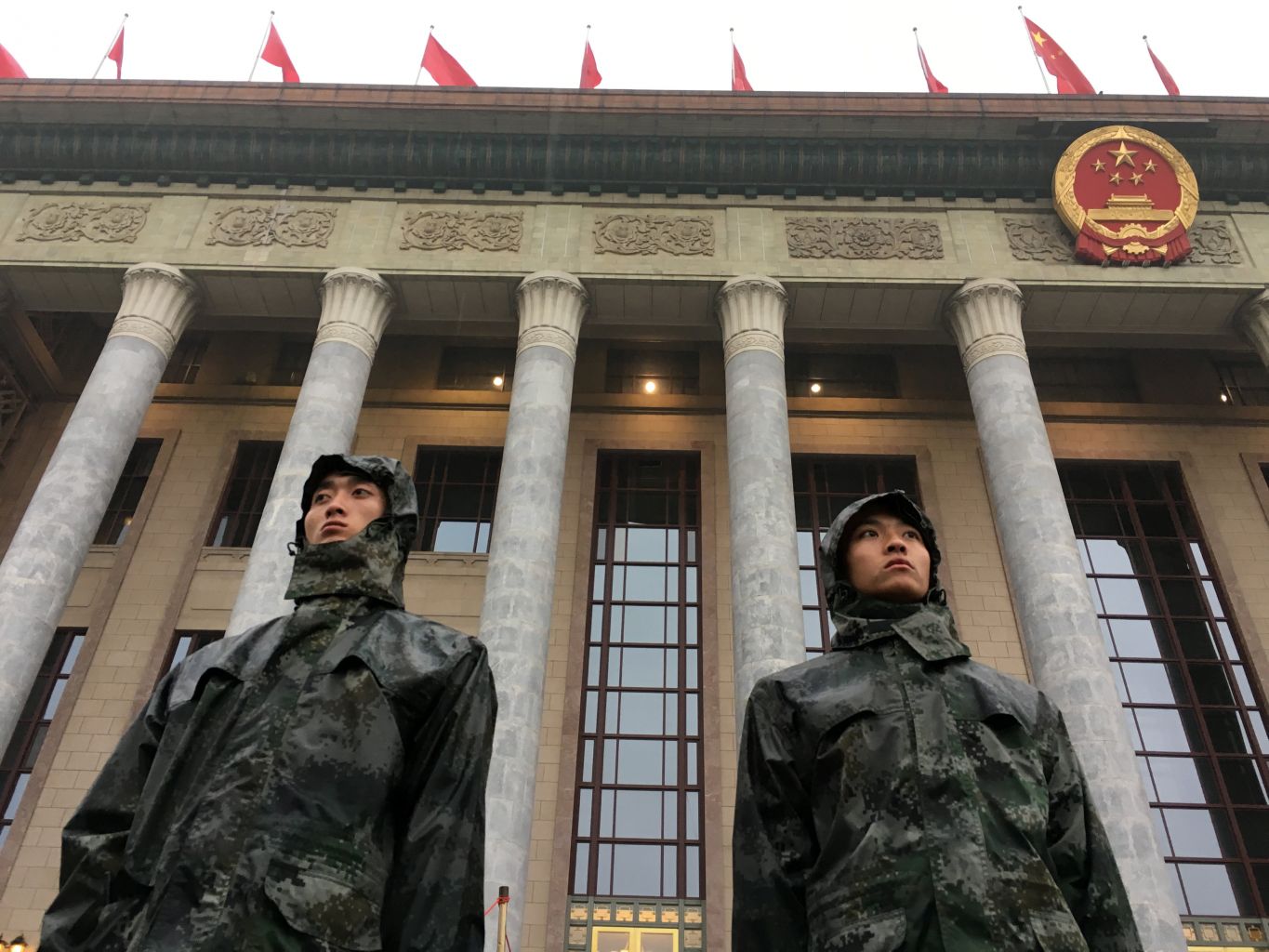19th Party Congress: China to be leading country in national power and global impact by 2050
Sign up now: Get insights on Asia's fast-moving developments

Soldiers standing guard outside the Great Hall of the People in Beijing before the opening of the 19th National Congress of the Chinese Communist Party.
PHOTO: REUTERS
BEIJING - Chinese President Xi Jinping on Wednesday (Oct 18) said that China will be a leading nation in comprehensive national power and global impact by 2050.
The period from now to 2020 will be a crucial one for China to achieve a "decisive victory in building a moderately prosperous society in all respects", said Mr Xi, who is the general secretary of the Chinese Communist Party, at the opening of the CCP's 19th national congress.
He was delivering the party's work report to more than 2,300 delegates and guests at the Great Hall of the People.
A key feature of this moderately prosperous society will be the doubling of people's incomes from the 2010 levels, and completely wiping out extreme poverty.
This is a goal he has set for the 2021 centennial celebrations of the CCP's founding.
Beyond 2020, he envisaged that China will be a global leader in innovation and achieve the basic level of a modern country by 2035.
And by the middle of the 21st century, China will become a "strong modern nation" in leading comprehensive national power and global impact.
In his wide ranging speech, Mr Xi also called for deeper reforms and bigger commitment to opening up the economy.
"Our economy has moved from a stage of high growth to a stage of high quality growth," he said.
The world's second largest economy has seen its growth slide during Mr Xi's first five-year term. Economic expansion dipped to a 26-year low of 6.7 per cent last year, only to see a pickup to 6.9 per cent for the first half of the year.
Senior economic officials have, in the past week, assured the people that the economy is improving and it could see a rebound this year.
China's central bank governor Zhou Xiaochuan said on Monday that the economy is likely to expand by 7 per cent in the second half of the year due to strong household spending.
Last week, the International Monetary Fund (IMF) has also upgraded its forecast for China's growth to 6.8 per cent, 0.1 percentage point higher than its previous forecast in July.
At the 18th party congress, then-president Hu Jintao had pledged for deeper reforms to transform China's growth model and set a target to double the people's average incomes by 2020.
It marked the first time that a long-term target for per capita income, rather than just overall gross domestic product (GDP) growth, had been highlighted at a party congress.
Mr Hu had also called for China to "unleash the potential of individual consumption".
In the five years that followed, the Chinese economy entered the phase of "new normal", where consumption overtook investments and exports as the major growth driver.
In the first half of this year, consumption accounted for 63.4 per cent of GDP growth, up from 51.8 per cent in 2012.
There had also been a shift from manufacturing to services.
The service sector's share of the GDP rose to 54.1 per cent in the first half of this year, up from 45.3 per cent in 2012.
In search of new growth drivers, Mr Xi unveiled an ambitious plan to revive two ancient trading routes on land and sea in 2013.
Known as the Belt and Road Initiative (BRI), this will see China build a series of roads, railways, ports and industrial parks across Asia, the Middle East, Africa and Europe.
It is seen as a way for China to export its overcapacity, build internationally competitive Chinese companies and stimulate growth in its western provinces.
On Wednesday, Mr Xi said the BRI will be a key instrument for China in widening its doors of opening up.
China will insist on equal emphasis on both attracting investments and getting its companies to venture out abroad, he said.
Following Mr Xi's speech, UOB Senior Economist Suan Teck Kin told The Straits Times: "The speech mentioned all the usual phrases: supply-side structural reforms, Belt and Road Initiative, innovation, so we can expect the existing policy measures to continue."
"The mention of state-owned enterprise reforms and market opening up is the same rhetoric so far,'' he said.
He noted that the more interesting part is the 2050 goal. "It is a very ambitious plan. China must have enough confidence to say that. It has to maintain a certain momentum of the growth trajectory from now to 2035 and eventually to 2050," Mr Suan said.
"But it's encouraging because at least it has a target to achieve. From now it is likely to focus its attention on building itself in various areas to work towards that," he said.
"2050 matters a lot more to the younger generation today, so it's to give them something to aspire to."


